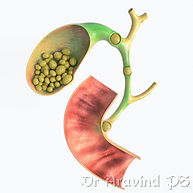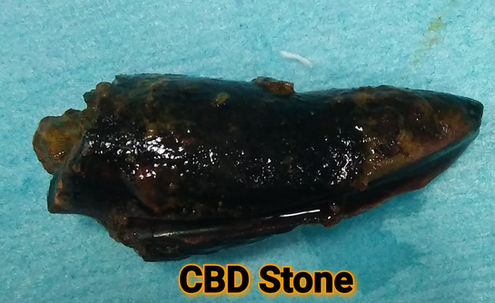
Dr. Aravind P.S.
MBBS, MS (General Surgery), M.Ch. (Surgical Gastroenterology), FMAS, FIAGES
Consultant Surgical Gastroenterologist
Laparoscopic Surgeon
Laser Surgeon
GI & HPB OncoSurgeon
Gall bladder & cbd stones

-
Gall bladder is a pear shaped organ, situated below the liver
-
Gall Bladder concentrates the bile and releases into the duodenum at the time of food intake, which helps in fat digestion
-
Cystic duct of the gallbladder joins the common hepatic duct to form common bile duct (CBD)
-
CBD joins the pancreatic duct at the lower end to finally enter into the 2nd part of duodenum
-
Gallbladder and CBD stones are the common benign biliary tract disorders
-
Gallbladder stones can be cholesterol stones, pigment stones or mixed stones
-
CBD stones can be primary or secondary (passed down stones from gallbladder)
Cholelithiasis v/s Choledocholithiasis
-
Gallbladder stones are also known as cholelithiasis
-
CBD stones are also known as choledocholithiasis
Why stones are formed in gallbladder?
-
Stones are formed in gallbladder whenever there is
-
Increased cholesterol, bilirubin or calcium in bile
-
Decreased bile salts in bile (which helps in stone dissolution)
-
Gallbladder stasis or dysmotility ( prolonged bile stasis in gallbladder results in stone/sludge formation)
-
What is incidental gall stone disease?
-
When gall stones are detected (without symptoms) by imaging done for other reasons
-
For eg.- detection of gallstones by ultrasonography (USG) done for kidney evaluation
What are the symptoms of Gall stone disease?
-
Pain in right upper quadrant of abdomen which may radiate to back
-
Nausea/vomiting
-
Fever
-
Jaundice ( due to complications)
Symptomatic v/s Asymptomatic Cholelithiasis
-
Gallstones with symptoms is called as "symptomatic cholelithiasis"
-
Gallstones without symptoms is called as "asymptomatic cholelithiasis"
I have incidentally detected gall bladder stones on USG. What should I do?
-
Not all incidentally detected or asymptomatic gallstones require treatment
-
However, there are some conditions which needs treatment even in the absence of symptoms
What are the risk factors for the development of gall stones?
-
Age > 40 years
-
Females ( 2 to 3 times higher than males)
-
Obesity
-
Sedentary life style etc.
Can gallstones be treated by medications?
-
No
-
Certain stone dissolving drugs which are used are associated with high incidence of side effects and recurrence of stones after stoppage
What is the treatment of symptomatic gallstone disease?
-
Cholecystectomy ( Surgical removal of gallbladder )
Laparoscopic or open cholecystectomy?
-
Laparoscopic cholecystectomy is the standard of care at present with the added advantages of laparoscopic surgery

What are the commonly done tests for Gall bladder/CBD stones?
-
Blood test - LFT ( Bilirubin, albumin, AST, ALT, ALP, GGT) , PT/INR
-
Imaging -
-
Ultrasonography
-
MRI scan
-
EUS (Endoscopic Ultrasonography)
-
CT scan
-

In which conditions patients with asymptomatic gall stone disease need to undergo surgery?
-
Sickle cell disease
-
Prolonged Total parental nutrition requirement
-
Chronic immunosuppression
-
No immediate access to health care facilities (e.g. military personnel etc)
-
At the time of abdominal surgery for other conditions
What are the complications of gall bladder stones?
Patients with gall stones especially if symptomatic are prone for complications
-
Cholecystitis - inflammation of gall bladder
-
Gangrenous cholecystitis - gangrenous changes in the wall of gall bladder
-
Perforation of gall bladder
-
CBD stones & cholangitis - Gall bladder stones may spill into the CBD and cause obstruction resulting in pain, fever & jaundice
-
Biliary pancreatitis- stone spillage into the lower end of CBD causing obstruction of pancreatic duct

What are the symptoms of CBD stones?
-
Pain
-
Fever
-
Jaundice

Does asymptomatic CBD stone require treatment?
-
Yes. Unlike asymptomatic gall stone disease all CBD stones require treatment
What are the treatment options for CBD stones?
-
Endoscopic removal (ERCP)
-
Surgery ( Laparoscopic or open)








